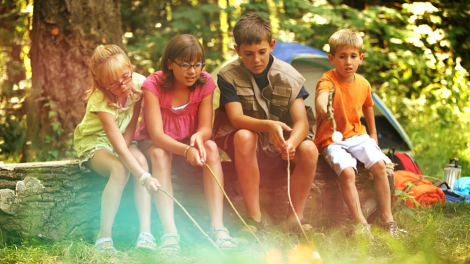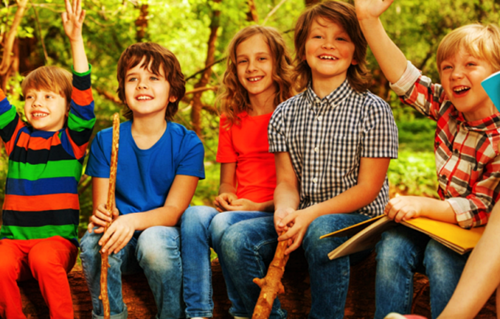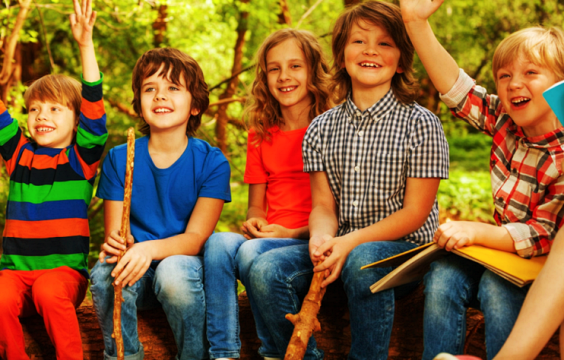Camping will create memories that will last a lifetime
Camping is an amazing experience and a great opportunity for children to leave the family nest. The first time however can be a challenge.


Camping can be a unique experience for every child, a never-ending game of discovery, as he realizes that he can make it on his own in a different environment, without the help, guidance or protection of his parents. Through this experience, his self-confidence and sociability can be stimulated and he can also acquire new skills. For most children, camping is a fun, entertaining, carefree group experience away from home. However, the first time a child goes camping is not always an easy and simple decision for parents, especially if we as children or adults have not had similar experiences ourselves. It is reasonable to wonder whether it is good to send our child to camp or not.
The answer to this question is not simple and one-dimensional. It depends on many factors, some of which are the following:
The Age of the child
We usually say that the best age for a child to go camping is after 7-8 years. At this age the social integration of the child in the school environment has already taken place, he can self-serve and follow rules and instructions. Of course, this limit is not absolute. Some children feel ready and ask to go camping earlier. This means that they have learned to separate from their parents and are able to mentally process this separation.
What the camp offers
A new environment can create anxiety in a young child. It is therefore helpful for parents and children to get informed about all the activities and if possible to visit the places up close. Sometimes, in an attempt to encourage children, parents may exaggerate with statements such as "it will be perfect", "you will play all day", etc. This does not help children because they create expectations that are not met. It is better to inform the child honestly and clearly, but also to prepare him for difficulties and for things that he may not like. This way he will have a realistic picture of what to expect and how he will spend his day and will not be easily disappointed.
It is a good idea to choose a camp that will include activities that the parents know the child will like and that will suit his or her character. Zurich has many camps that offer different kinds of activities for all tastes. There are fitness camps such as Children's wonder, a children's yoga & nature holiday camp, science camps like Spark Science or TechLabs STEM, and nature camps like The Waldchind Fuchstreff Playgroup & Camp and many more.
Separation from parents and the home
This is, perhaps, the greatest difficulty of camping and often the greatest concern of parents. Here again are some issues for parents to consider: has the child ever slept away from home? For example, has he managed to stay with a friend at night? Does he sleep all night in bed alone? It makes no sense to prepare to send to camp a child who is overprotected in his home and can not do basic things on his own, such as getting dressed, tying his shoelaces, taking a bath, eating many different things.
What else is going on in the child's home and life at this time
This is a very important factor that is often not taken into account while it is directly related to whether the child will adapt and stay in camp. It has to do both with practical issues that help, e.g. if there are older siblings or cousins or friends who will be going camping at the same time, if the parents are relatively close and can visit the child, as well as the social conditions prevailing in the home and life and may act as a deterrent e.g. if the parents are going through a marital crisis, if the mother is pregnant, or other special conditions of "imminent danger" for a child. Often when there are difficulties in the family, the parents consider that it is better for the child to "leave". The paradox is that just then the children can not or do not want to leave. So if there are such special circumstances it is always better to discuss openly and honestly than for a child to leave carrying the anxiety and the weight of what he leaves behind.
The child’s personality
Parents know the unique character of their child. And it is important to take this into account especially since for some children their character facilitates their adaptation and allows them to have a great group experience, while for other children the camping experience will be helpful in opening up their character and autonomy. It is common and expected in the first few days for a child - especially if it is their first time going camping - to feel nostalgic or to complain when they see or talk to their parents. It is important for parents to weigh their anxiety by avoiding questions like "Did you eat?", "Did you sleep?" etc. It is more helpful to have a positive attitude, trying to ask about pleasant things, such as the games he plays and the friends he has made. With a positive attitude and composure, the message is passed on to the child that they have confidence both in themselves and in the people of the camp. However, if a child cries constantly, is sad or scared and is not really having a good time, the parents may need to visit or even take him back home. In this case, it is important not to give him the feeling that he has failed in something that he should definitely succeed. In fact, we can emphasize that the effort he made to stay a few days is already an achievement and he can try again when he feels more ready for this experience.
The goal is for the experience of camping to leave a positive imprint of carelessness and fun, which will be helpful for the child's development in the present and the future.


Sign up here to hear more from us!
Read more from our list of topics about how to have fun with kids
Try 1 FREE month of Kiwi Co with all 6 and 12 month subscriptions!
